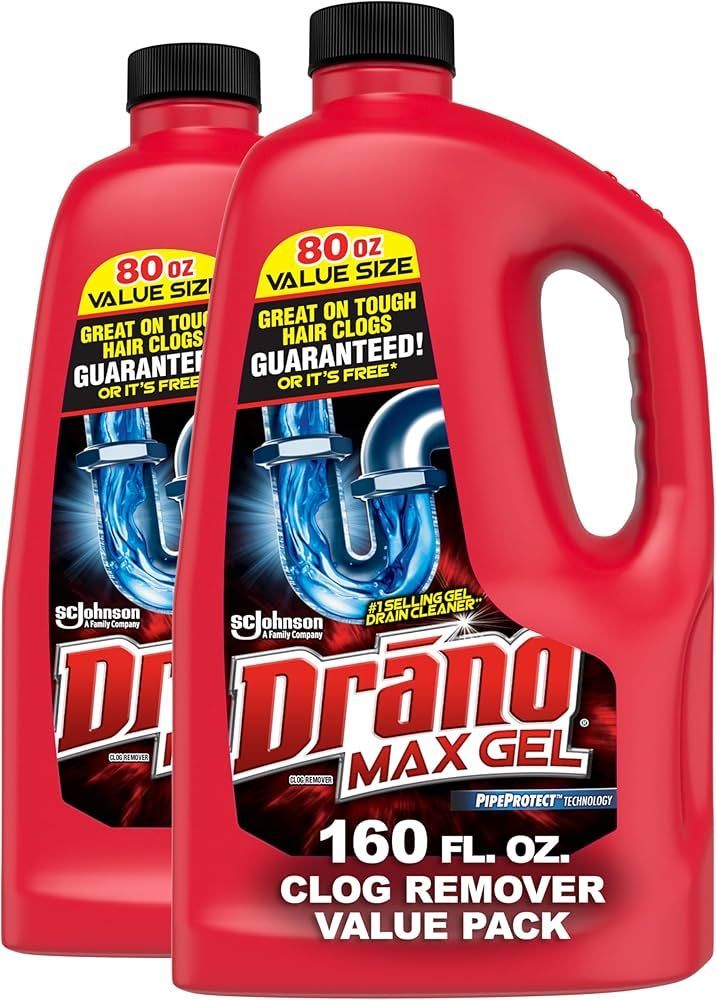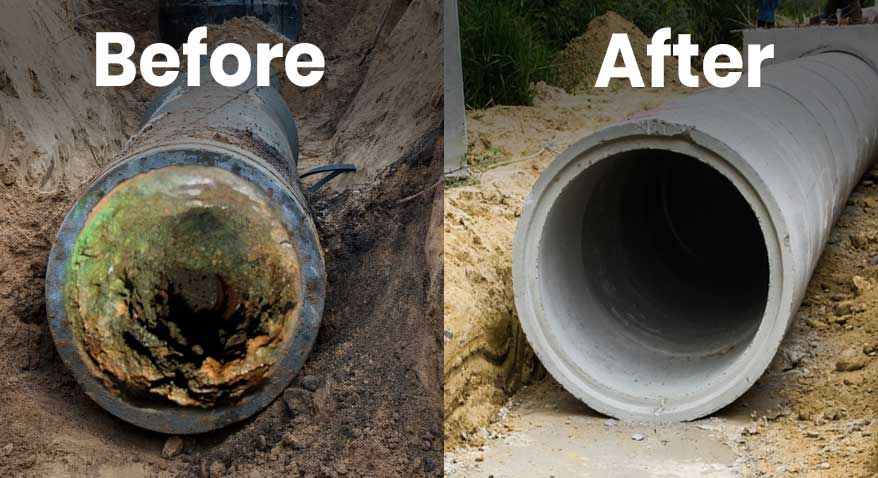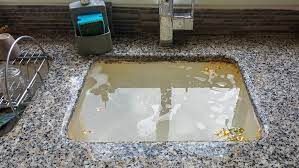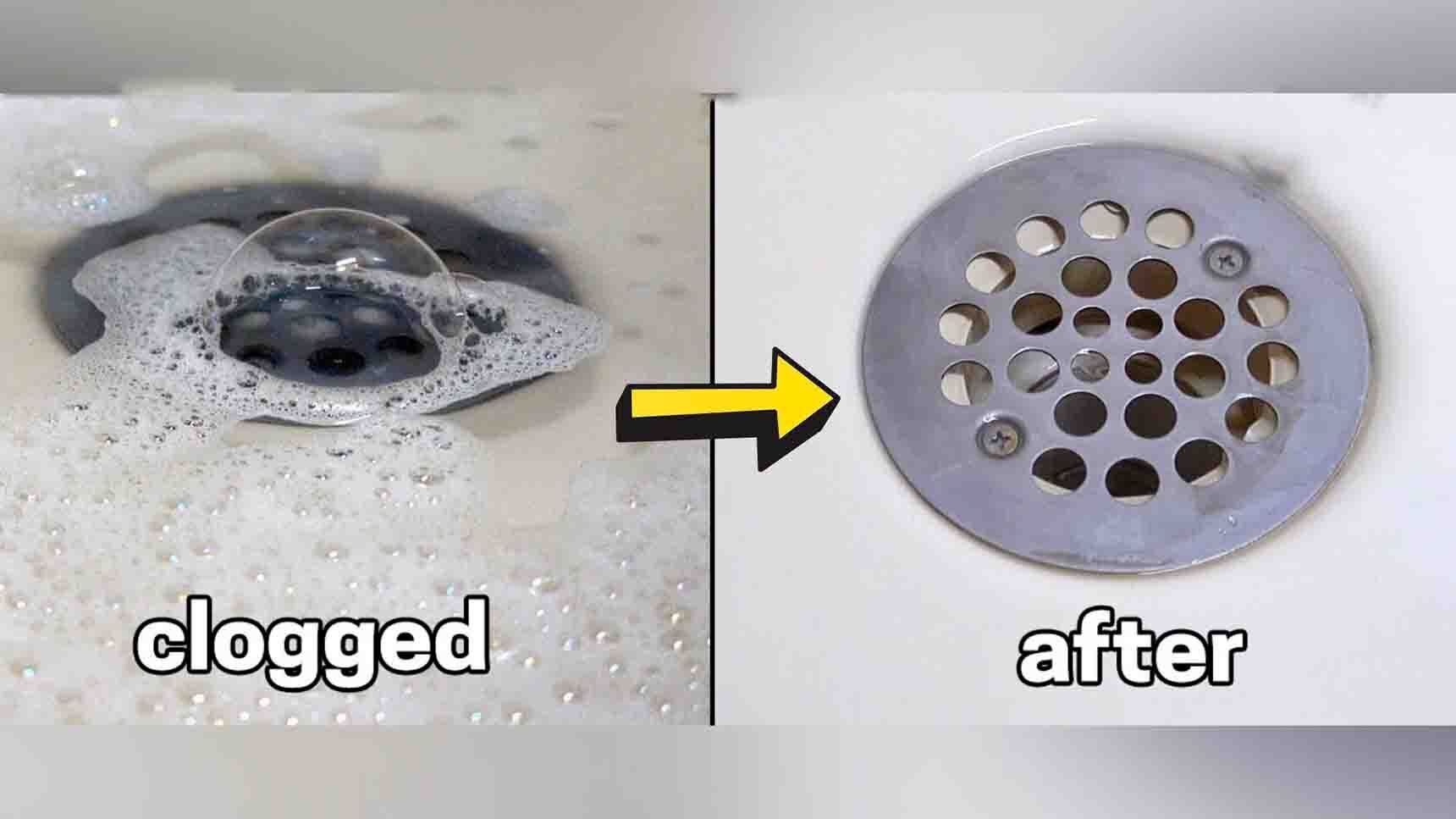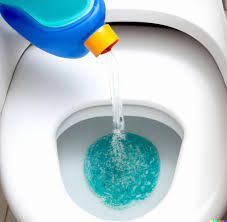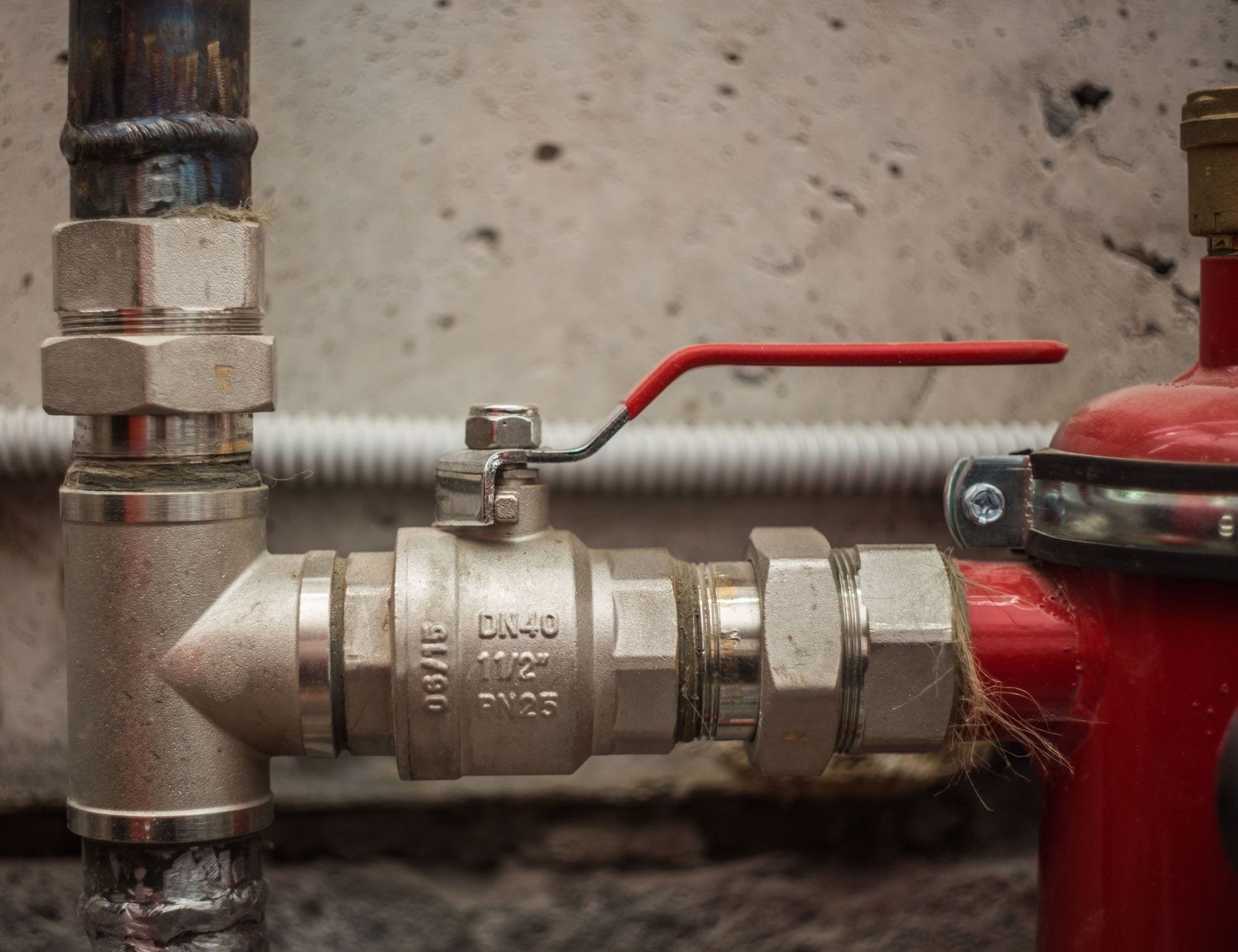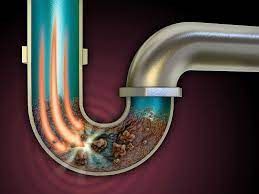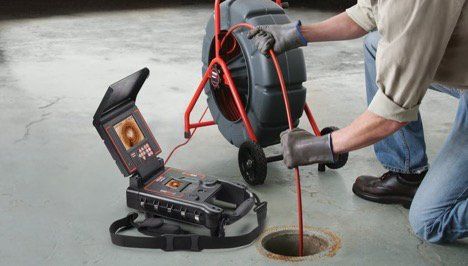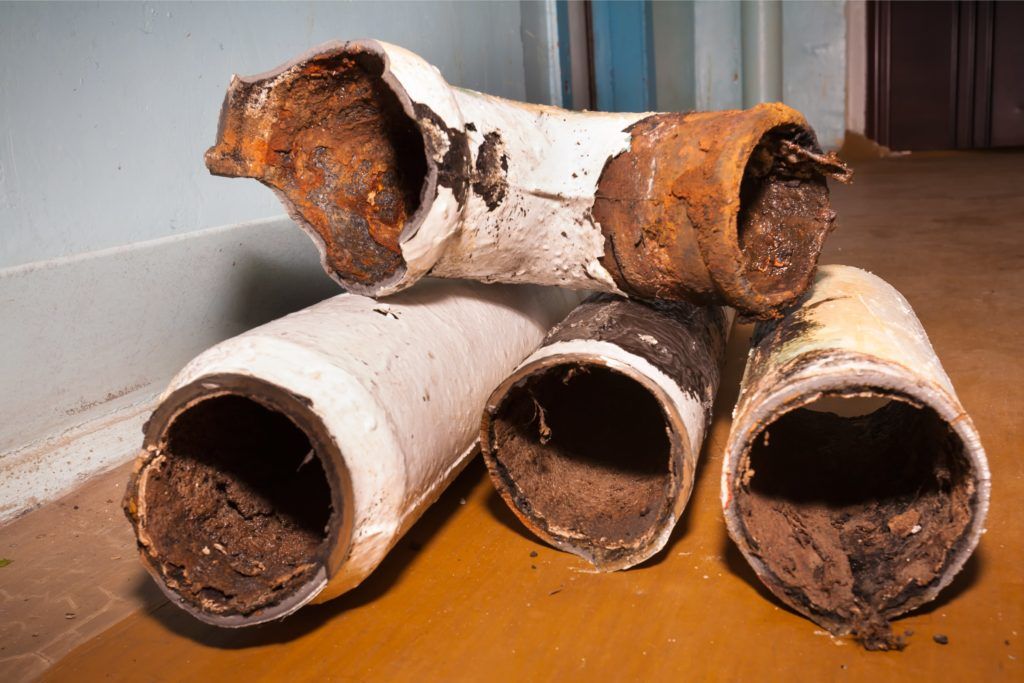What’s The Best Way to Remove Calcium Buildup in Your Homes Drains & Pipes? (Updated)
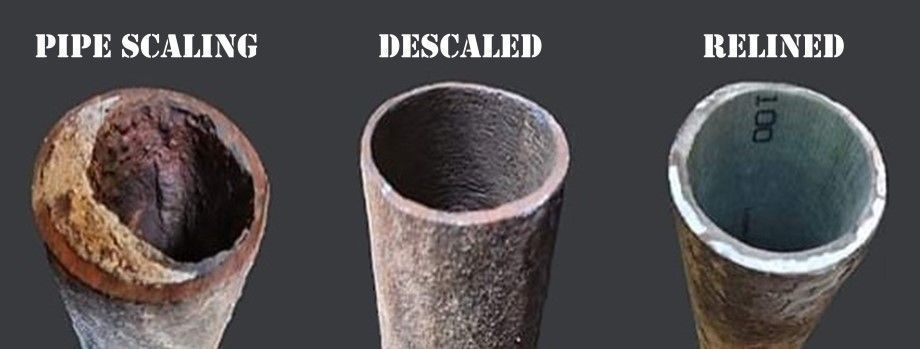
Calcium buildup in drains and pipes is a common problem in many households. Over time, minerals present in the water can accumulate and form a hard, stubborn layer of calcium deposits. These deposits can restrict the flow of water and eventually lead to clogged drains and pipes. To prevent this from happening, it is important to regularly remove calcium buildup and maintain the optimal functioning of your plumbing system.
There are several methods that can effectively remove calcium buildup from drains and pipes. One popular method is using a mixture of vinegar and baking soda. This natural and chemical-free solution can break down the calcium deposits and clear the clogs. To use this method, simply pour a cup of baking soda down the drain, followed by a cup of vinegar. Allow the mixture to sit for about 30 minutes, and then flush it out with hot water. This method is not only effective but also environmentally friendly.
Another effective way to remove calcium buildup is by using a commercial descaler or a lime scale remover. These products are specifically designed to dissolve mineral deposits and can be found in most hardware stores. To use a descaler, follow the instructions on the product label, as different brands may have different application methods. Generally, you would need to pour the descaler into the affected drain or pipe, let it sit for a specified amount of time, and then flush it out with water.
Prevention is key when it comes to dealing with calcium buildup in drains and pipes. Regularly cleaning your drains and pipes with hot water can help prevent the accumulation of minerals and keep your plumbing system running smoothly. Additionally, using a water softener can also eliminate hard water and the amount of calcium buildup & mineral deposits present in your water supply, giving your clear flowing cleaner water. Drain Brain LLC today at 720-322-4845 we can help.
How To Deal with Calcium Build up in Drains & Pipes in your Denver Home
Calcium buildup in your homes drains & pipes occurs when hard water passes through the plumbing system. Hard water contains minerals such as calcium and magnesium, which can accumulate over time, leading to clogged pipes. As the water flows through the pipes, these minerals settle and form a hard residue, restricting water flow and causing plumbing issues.
Calcium buildup is a prevalent issue in areas with hard water, which is known for its high mineral content containing calcium, potassium, and magnesium. These three minerals can cause significant damage to your home's drains and pipes. The accumulation of calcium buildup & mineral deposits can lead to clogged drains and reduced water flow.
It is essential not to ignore these early signs of plumbing issues and take proactive measures to prevent further damage. Hard water contains a high concentration of minerals, primarily calcium, potassium, and magnesium. When this water flows through your plumbing system, these minerals can accumulate over time and form stubborn deposits. Calcium buildup is particularly common in areas with hard water due to the high levels of calcium present.
These deposits can cause blockages in your pipes, leading to clogged drains and reduced water flow. If left untreated, calcium buildup can wreak havoc on your plumbing system. As the deposits continue to accumulate, they can restrict the flow of water through your pipes, causing backups and potential damage. Ignoring these early signs of plumbing issues can result in costly repairs down the line. Therefore, it is crucial to address the problem as soon as possible.
To avoid the detrimental effects of calcium buildup, it is advisable to take preventive measures. Regularly cleaning and maintaining your homes drains and pipes can help remove any existing deposits and prevent future buildup. Additionally, using water softeners or installing a water filtration system can reduce the mineral content in your water, minimizing the risk of calcium deposits. Drain Brain LLC today at 720-322-4845 we can help.
What Caused the Calcium Buildup in Your Pipes?
Quickly Identifying calcium buildup before it causes serious plumbing issues including clogged drains & other plumbing problems in your drains & pipes caused by hard water is crucial for early detection and prevention of other serious plumbing issues. Calcium deposits in your home’s pipes are very common especially if you have hard water or worse water that has a high mineral content from potassium, magnesium or calcium look for crusty white limescale you will find it on the dishwasher & dishes, kitchen & bathroom sink and especially the toilet.
1. Just look for slow drains: If water is taking longer than usual to drain from your sinks, bathtubs, or showers, it could be a sign of calcium buildup. As the crusty white residue accumulates, it creates a narrow passage for water to flow through, causing drainage problems.
2. Foul odors: Calcium buildup can trap organic matter, such as hair and soap scum, leading to unpleasant odors emanating from your drains. If you notice a persistent foul smell, it's likely that calcium buildup is present.
3. Low water pressure: As calcium buildup restricts water flow, you may experience decreased water pressure in your faucets and showerheads.
This can be frustrating and inconvenient, making everyday tasks like washing dishes or taking a shower more difficult. Drain Brain LLC today at 720-322-4845 we can help.
If you notice any of these calcium buildup like hard crusty & chalky deposits, it's important to take action to remove the calcium buildup in your drains & pipes before it worsens. Ignoring the issue can lead to more severe plumbing issues including clogged drains which is usually started with & caused by hard water. Pouring CLR or baking soda & vinegar are fast home remedies, however they only work temporarily, and the mineral & calcium deposits will be back unless you find out what is causing the problem. Contacting a Denver plumbing company like Drain Brain LLC who has seen these plumbing issues that typically start with hard water and creates the calcium buildup and the white chalky, crusty, stains that can cause corrosion and blockage in your homes drains & pipes if not fixed.
Why is PEX Pipe Recommended to Reduce Limescale?
Why Choose PEX Piping to Combat Limescale?
When it comes to reducing limescale, opting for PEX piping is an excellent choice. Here's why:
Limescale Resistance: PEX (cross-linked polyethylene) pipes are inherently more resistant to limescale buildup compared to traditional copper pipes. This is due to the smooth inner surface of PEX, which minimizes mineral deposits.
Durability and Flexibility: PEX pipes boast a high level of flexibility, making them less prone to cracks and leaks. Their design allows them to expand and contract, which not only reduces maintenance but also prolongs the lifespan of the plumbing system.
Cost-Effective Option: Installation of PEX is typically more cost-effective. Its ease of installation results in savings on labor costs, and its long-term resistance to limescale means fewer repairs and replacements.
Temperature and Pressure Resilience: PEX can handle a wide range of temperatures and pressures without compromising its structural integrity. This resilience adds an additional layer of protection against limescale, which can often result from temperature fluctuations in water systems.
By choosing PEX piping, homeowners can enjoy a more efficient plumbing system with fewer issues related to limescale, leading to long-term savings and improved water flow.
Dealing With & Fixing Calcium Buildup in Drains & Pipes
Calcium buildup in drains & pipes not only affects the performance of your homes plumbing pipes but can also cause significant hard water damage if left untreated. Here are Calcium buildup in pipes that can cause major plumbing issues of which hard water is usually the cause:
1. Clogged drains: As the buildup accumulates, it can completely block the drains & pipes, resulting in clogged drains. This can lead to water backup, flooding, and damage to your property.
2. Corrosion: The minerals in hard water, including calcium, can corrode the inner lining of the pipes over time. This corrosion weakens the pipes, making them more prone to leaks and breakage.
3. Reduced lifespan of appliances: Calcium buildup can affect the efficiency and lifespan of appliances connected to your plumbing system, such as dishwashers and washing machines. The buildup can interfere with the proper functioning of these appliances, leading to costly repairs or replacements. Drain Brain LLC today at 720-322-4845 we can help.
These potential consequences highlight the importance of addressing calcium buildup in drains & pipes promptly. By removing the calcium buildup & mineral deposits, you can restore proper water flow, prevent damage to your plumbing system, and extend the lifespan of your appliances.
Drain Brain LLC today at 720-322-4845 we can help.
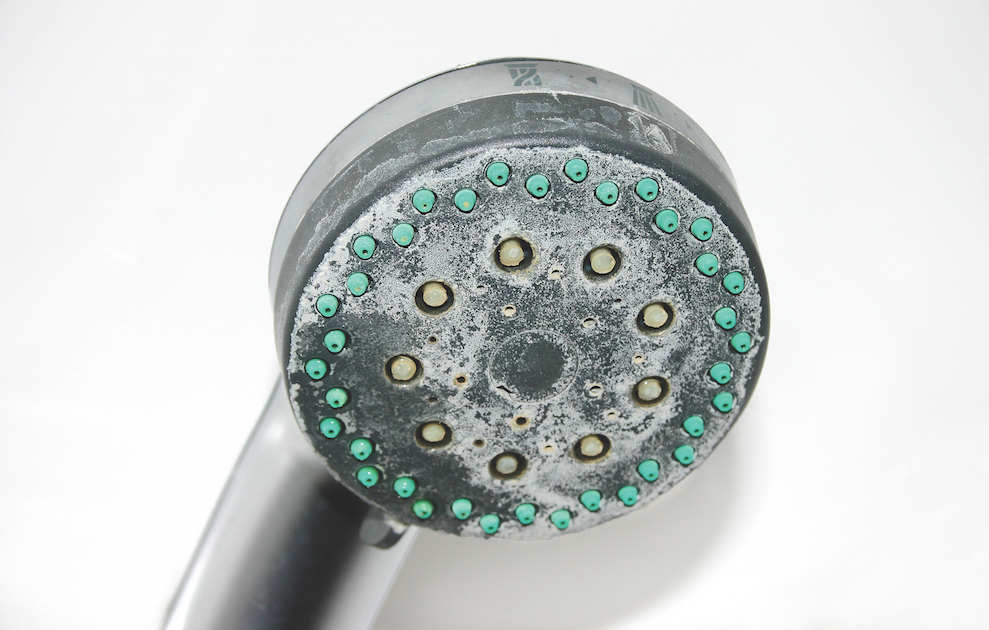
When it comes to removing calcium buildup & mineral deposits in shower drains due to sodium magnesium, potassium and other hard water chemicals, there are several calcium buildup & mineral deposit removers to choose from. The right method for you will depend on the severity of the calcium buildup & mineral deposits and how bad the calcium buildup is. The DIY solutions may not work in cases that the calcium buildup & mineral deposits have clogged the drains & pipes and the water is barely flowing. Get a plumber like Drain Brain LLC to help with plumbing issues caused by hard water, calcium buildup & mineral deposits they can help you get rid of these hard water issues before they do serious damage to your drains & pipes.. Here are the different options:
If you prefer a more hands-on approach and want to save some money, there are several DIY solutions you can try to remove calcium buildup from shower drain. These methods often use household ingredients and can be effective for mild to moderate buildup. Here are some popular DIY methods:
1. Vinegar and baking soda: This natural and inexpensive solution can help dissolve calcium buildup. Start by pouring a cup of baking soda into the drain, followed by a cup of vinegar. Let the mixture sit for a few hours, then flush it out with hot water. This method can help break down the buildup and improve water flow.
2. Boiling water: For minor calcium buildup, simply pouring boiling water down the drain can help dislodge the residue. Boiling water has the added benefit of sanitizing the drain, eliminating any lingering odors.
3. Salt and lemon: Create a mixture of salt and lemon juice and pour it down the drain. Let it sit for a while before flushing it out with hot water. The acidity of the lemon juice combined with the abrasive properties of salt can help loosen the calcium buildup.
These DIY solutions can be effective for mild cases of calcium buildup. However, they may not be sufficient for a more severe calcium buildup. If you're facing stubborn calcium deposits or prefer a more hands-off approach, chemical solutions may be a better option or call Drain Brain LLC Denver’s best plumber for fixing calcium build up & mineral deposits caused by hard water once and for all.
What Chemical Solution Removes Calcium Buildup in Your Drains & Pipes
Chemical solutions are readily available in stores and are designed specifically to dissolve calcium buildup in drains & pipes. Chemical products can be dangerous & often containing powerful acids or enzymes that break down the residue, restoring water flow. Be careful when using them, here are some common chemical solutions.
1. Calcium lime rust remover (CLR): CLR is a popular choice for removing calcium buildup. It's a powerful cleaner that can dissolve mineral deposits, including calcium, lime, and rust. Follow the instructions on the product label for the best results.
2. Acid-based cleaners: Acid-based cleaners, such as Muriatic acid, a powerful hydrochloric acid or sulfuric acid, are effective at breaking down calcium buildup. However, these products can be corrosive and should be used with caution. Always follow the manufacturer's instructions and wear protective gear when handling these cleaners.
3. Enzyme cleaners: Enzyme-based cleaners use natural enzymes to break down organic matter and mineral deposits. These cleaners are often safer to use and can be effective for moderate calcium buildup. Look for enzyme cleaners specifically formulated for drain maintenance.
Chemical solutions can be more powerful and efficient in removing calcium buildup compared to DIY methods. However, it's important to use these products carefully and follow the instructions to avoid any damage to your plumbing system or harm to yourself. Call Denver’s best plumber Drain Brain LLC if the calcium build up is serious and needs a drain cleaning expert.
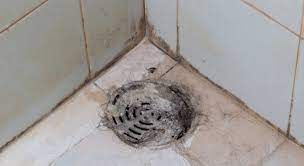
Preventing Calcium Buildup in Drain Pipes & Faucet
Prevention is key when it comes to calcium buildup in drains & pipes and on your faucet. By taking proactive measures, you can minimize the occurrence of calcium buildup & mineral deposits on your faucet created by hard water and prolong the lifespan of your faucet & plumbing system. Here are some preventive measures you can implement:
1. Water softening: Installing a water softener can significantly reduce the mineral content in your water, preventing the formation of calcium buildup. Water softeners work by replacing calcium and magnesium ions with sodium ions, resulting in softer water.
2. Regular cleaning: Regularly cleaning your drains can help prevent the buildup of minerals and organic matter. Use natural or chemical cleaners specifically formulated for drain maintenance. Avoid using harsh chemicals that can damage your pipes.
3. Strainers and filters: Installing strainers or filters in your drains can help catch debris and prevent them from accumulating in your pipes. This can reduce the likelihood of calcium buildup and clogged drains.
By implementing these preventive measures, you can reduce the hard water and severity of calcium buildup in your drain pipes, saving you from the hassle of dealing with clogs and plumbing issues. Call Denver’s best plumber, Drain Brain LLC today at 720-322-4845 we can help.
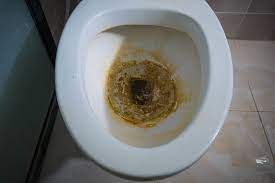
Calcium buildup in Toilet Bowl, How to Remove it?
Calcium buildup in the toilet bowl is a common issue that many homeowners face. Over time, minerals from hard water can accumulate and form a thick layer of calcium deposits, making the toilet bowl look dirty and unappealing. Fortunately, there are several effective methods to remove calcium buildup and restore the cleanliness of your toilet bowl.
One of the easiest ways to remove calcium buildup from the toilet bowl is by using a mixture of vinegar and baking soda. Start by pouring a cup of vinegar into the toilet bowl and letting it sit for a few hours. Then, sprinkle some baking soda over the vinegar and scrub the bowl using a toilet brush.
The combination of vinegar and baking soda helps to dissolve the calcium deposits and make them easier to remove. Another method to remove calcium buildup is by using commercial descaling agents specifically designed for toilets. These products contain chemicals that break down the calcium deposits and make them easier to scrub away. Follow the instructions provided by the manufacturer for best results. It is important to note that these products may contain harsh chemicals, so be sure to wear gloves and ventilate the bathroom properly while using them.
For stubborn calcium buildup that is difficult to remove with vinegar or commercial descaling agents, a pumice stone can be used. Wet the pumice stone and gently scrub the affected areas of the toilet bowl. Be careful not to apply too much pressure as this may scratch the porcelain surface. Rinse the toilet thoroughly after using the pumice stone to remove any residue.
Prevention is key when it comes to dealing with calcium buildup in the toilet bowl. Regularly cleaning the toilet bowl with a mild acidic cleaner, such as lemon juice or vinegar, can help prevent calcium deposits from forming. Additionally, using a water softener or installing a water filter can reduce the amount of minerals in your water supply, thereby minimizing calcium buildup. Call Denver’s best plumber, Drain Brain LLC today at 720-322-4845 we can help.
What are the Challenges of Descaling Water Supply Pipes?
The Challenges of Descaling Water Supply Pipes
Descaling water supply pipes presents specific challenges that require careful consideration. One primary concern is the potential introduction of hazardous chemicals into your drinking water, which poses significant health risks. As such, finding a safe and effective method is crucial.
Some homeowners explore natural alternatives like vinegar or baking soda to avoid chemical contaminants. However, these substances have their own limitations.
Here are the main challenges:
Volume Required: To effectively tackle significant deposits, exceptionally large quantities of vinegar or baking soda would be needed, which can be impractical for extensive plumbing systems.
Residue Taste: Using vinegar can result in a lingering taste and odor permeating your water, which is undesirable for most people.
Incomplete Removal: Natural methods might not fully eliminate stubborn limescale, especially in older pipes with substantial buildup.
Given these challenges, it’s vital to seek professional advice or consider specialized descaling products designed for safe use in potable water systems. Balancing effectiveness with safety is key to maintaining the integrity and quality of your water supply.
How they answer this question
How to Clean Calcium Buildup
Calcium buildup can be a common problem in households, especially in areas with hard water. It can leave stubborn stains on faucets, showerheads, and other surfaces, making them appear dull and dirty. However, with the right techniques, cleaning calcium buildup can be a relatively simple task.
To begin with, it is important to gather the necessary supplies. A mild acidic solution, such as vinegar or lemon juice, is effective in breaking down calcium deposits. Additionally, a soft cloth or sponge, a toothbrush, and a plastic scraper can be useful tools in removing the buildup.
Next, it is essential to apply the acidic solution to the affected areas. This can be done by soaking a cloth or sponge in the solution and then gently scrubbing the surface. For smaller or hard-to-reach areas, such as around faucets or showerheads, a toothbrush can be used to apply the solution more precisely.
After applying the solution, it is important to let it sit for a few minutes to allow the acid to break down the calcium deposits. This will make it easier to remove the buildup. Once the solution has had time to work its magic, the surface can be rinsed thoroughly with water.
In some cases, particularly severe calcium buildup may require additional methods. In such instances, a plastic scraper can be used to gently scrape away the stubborn deposits. However, caution should be exercised to avoid scratching or damaging the surface.
Finally, after the calcium buildup has been successfully removed, it is important to prevent future buildup. Regular maintenance and cleaning can help prevent calcium deposits from forming in the first place. Using water softeners or installing water filters can also be effective in reducing the amount of calcium in the water supply. Call Denver’s best plumber, Drain Brain LLC today at 720-322-4845 we can help.
What causes calcium buildup in my drains and pipes?
Calcium buildup, also known as limescale, is caused by hard water—water rich in minerals like calcium and magnesium. Over time, these minerals stick to the inside of your pipes and drains, reducing water flow and eventually causing clogs or damage.
Is there an alternative way to clean a shower had without removing it?
Alternative Method for Cleaning a Shower Head Without Removal
If you don’t have tools on hand, there’s a simple trick for cleaning a shower head without having to remove it. Fill a plastic bag with white vinegar and carefully secure it around the shower head so the spray holes are fully submerged. Fasten the bag in place using a rubber band or twist tie, then let it soak overnight.
The mild acid in the vinegar will help dissolve stubborn calcium deposits. In the morning, remove the bag and run the water to rinse away any remaining residue.
This hands-off approach works well for routine buildup and can help restore your shower’s flow with minimal effort.
How can you clean and remove calcium buildup from your shower head
If your shower head has started spraying water unevenly or you’re noticing a white, chalky coating, it’s probably time for a little DIY TLC.
Thankfully, tackling calcium buildup on a shower head is a straightforward process and doesn’t require any special plumbing wizardry. Here’s how you can restore a sparkling, free-flowing shower in just a few steps:
What You’ll Need,
Adjustable wrench or pliers
Old rags or towels
Distilled white vinegar
Plastic bag (large enough to wrap around your shower head) or a small container
Rubber bands or twist ties
Step-by-Step Instructions
Protect Your Fixtures: Start by wrapping a rag around the shower head fitting. This simple step keeps the metal safe from scratches if you need to use a wrench or pliers.
Remove the Shower Head (Optional): If you can easily unscrew your shower head, do so with your hands or gently with tools.
Not keen on taking it off the wall? No problem—keep reading!
Soak in Vinegar:
If Removed: Place the shower head in a container or bowl and pour enough white vinegar to completely cover it. Let it soak overnight.
If Still Attached: Fill a sturdy plastic bag with vinegar, then submerge the shower head in the bag. Secure it in place with rubber bands or a twist tie, making sure the spray holes are fully immersed. Allow it to sit overnight.
Rinse and Scrub: In the morning, remove the shower head from the vinegar.
Rinse thoroughly under tap water, using an old toothbrush to gently scrub away any remaining mineral deposits.
Reassemble and Test: If you removed the shower head, screw it back on carefully, tightening by hand first and then finishing snugly with your wrench if needed. Turn on the water and check for smooth, revitalized flow.
This method offers a simple, eco-friendly way to banish stubborn calcium deposits using household staples. Plus, your morning showers will feel refreshingly clean again!
What are the steps for removing, soaking, and reinstalling a shower head to get rid of mineral deposits?
How to Remove, Soak, and Reinstall a Shower Head to Eliminate Mineral Deposits
If you suspect that hard water has left mineral deposits clogging your shower head, a thorough cleaning can make a world of difference for your water flow.
Here’s a simple step-by-step guide to tackle those stubborn calcium and mineral buildups:
First, protect your shower fixture’s finish by wrapping a rag or cloth around the shower head connection. This helps prevent scratches when loosening the shower head.
Next, carefully unscrew the shower head using a pair of pliers or a pipe wrench. Take your time—steady, gentle pressure is often all you need.
Once removed, place the shower head in a container (an old Tupperware or bowl works well).
Pour in enough white vinegar to submerge the head completely. The acidity in vinegar helps dissolve mineral deposits naturally.
For best results, let it soak overnight. This gives the vinegar plenty of time to break down those tough deposits.
After soaking, thoroughly rinse the shower head under tap water to wash away any remaining residue. If needed, use an old toothbrush to gently scrub any stubborn spots.
Finally, screw the shower head back on, hand-tightening first before using your wrench—don't forget the rag to protect the finish!
With these easy steps, you can restore full water flow and keep mineral buildup at bay.
This process is especially helpful for Denver area homeowners dealing with persistent hard water issues.
What materials do you need to soak and clean a shower head?
What You'll Need to Soak and Clean a Shower Head
Before you start tackling calcium buildup on your shower head, it’s helpful to have the right tools and materials handy for a smooth, effective cleaning process:
White vinegar or lemon juice – These gentle acids help dissolve tough mineral deposits without damaging most finishes.
A sturdy plastic bag or a small bowl – Perfect for fully submerging the shower head in your chosen solution.
Rubber bands or twist ties – Useful for securing the bag around the shower head if you’d rather clean it in place.
A soft cloth or sponge – For wiping away loosened grime and ensuring a spotless finish.
An old toothbrush – Ideal for scrubbing away buildup from hard-to-reach areas and tiny nozzles.
A towel or rag – To catch any drips and keep your workspace dry.
Having these simple items ready will make the cleaning process faster and help restore your shower head’s shine.
How do I know if I have calcium buildup?
Common signs include:
Reduced water pressure
White, chalky deposits around drains or faucets
Slow-draining sinks or tubs
Appliances like dishwashers or water heaters losing efficiency
What’s the most effective way to remove calcium buildup in my pipes?
The best professional method is hydro jetting, which uses high-pressure water to blast away mineral buildup. For DIY options, you can try:
Vinegar & Baking Soda: Pour 1 cup of baking soda followed by 2 cups of hot white vinegar into the drain. Let it sit for an hour, then flush with hot water.
Descaling Products: Use products designed for calcium removal (like CLR or Lime-A-Way). Always follow manufacturer instructions carefully.
How can you use vinegar to clean mineral buildup from, dishwashers, washing machines, coffee makers, shower doors, and faucets?
To begin with, it is important to gather the necessary supplies. A mild acidic solution, such as vinegar or lemon juice, is effective in breaking down calcium deposits.
Additionally, a soft cloth or sponge, a toothbrush, and a plastic scraper can be useful tools in removing the buildup.
Next, it is essential to apply the acidic solution to the affected areas. This can be done by soaking a cloth or sponge in the solution and then gently scrubbing the surface. For smaller or hard-to-reach areas, such as around faucets or showerheads, a toothbrush can be used to apply the solution more precisely.
After applying the solution, it is important to let it sit for a few minutes to allow the acid to break down the calcium deposits. This will make it easier to remove the buildup.
Once the solution has had time to work its magic, the surface can be rinsed thoroughly with water.
In some cases, particularly severe calcium buildup may require additional methods. In such instances, a plastic scraper can be used to gently scrape away the stubborn deposits.
However, caution should be exercised to avoid scratching or damaging the surface.
Tips for Tackling Specific Areas Around the Home
Dishwasher: Pour a cup of white vinegar into the bottom of your Dishwasher and run it through a complete cycle—do this monthly to prevent buildup and keep your machine running smoothly.
Washing Machine: Add a gallon of white vinegar to your empty Washing Machine and run a hot water cycle. This helps remove any hidden calcium deposits from inside the drum.
Coffee Maker: Fill the water reservoir with white vinegar and run a brewing cycle. To ensure there’s no lingering vinegar taste, follow up with two cycles of plain water.
Shower Doors: Spray glass shower doors with white vinegar to dissolve lime scale and hard water stains.
Let it sit before wiping clean for a sparkling result.
Faucets: Wrap a vinegar-soaked cloth or a plastic bag filled with vinegar around the fixture overnight. For more thorough cleaning, unscrew the fixture and soak it in a vinegar bath.
These targeted approaches can significantly reduce calcium buildup on a variety of surfaces, keeping your appliances and fixtures looking and functioning their best.
Is vinegar strong enough for heavy calcium deposits?
Vinegar is effective for mild to moderate buildup, especially when used regularly. For stubborn, thick deposits inside pipes, professional descaling or hydro jetting is often required.
Can calcium buildup damage my plumbing?
Yes. Over time, limescale can restrict flow, corrode pipes, reduce appliance lifespan, and even lead to complete blockages or pipe replacement if left untreated.
How can I prevent calcium buildup in the future?
How can I prevent calcium buildup in the future?
Install a water softener: This reduces mineral content in your water supply.
Use vinegar monthly: Flush drains with vinegar to help prevent buildup.
Check faucets and aerators: Clean these regularly to reduce surface limescale.
Extra Tips for Home Appliances and Fixtures
Dishwasher: Once a month, add a cup of white vinegar to your dishwasher and run a normal cycle (no dishes needed). This helps break down limescale and keeps your dishwasher smelling fresh.
Washing Machine: Pour a gallon of white vinegar into the drum and run one hot water cycle (without clothes). This helps dissolve hidden mineral deposits.
Coffee Maker: Fill the reservoir with white vinegar and run a brewing cycle. Follow it up with two fresh water cycles to eliminate any lingering vinegar taste or smell.
Shower Doors: Spray glass shower doors with white vinegar to remove limescale and hard water stains. Let it sit for a few minutes, then wipe clean.
Faucets: Soak a cloth in vinegar or wrap the fixture in a plastic bag filled with vinegar and leave overnight.
For tough deposits, you can also remove the fixture and soak it directly in vinegar.
A little routine maintenance goes a long way—regular vinegar treatments and quick checks can help your appliances and fixtures stay limescale-free.
.
Should I call a plumber for calcium removal?
If DIY solutions don’t work, or if you suspect widespread buildup in your plumbing system, it’s smart to call a licensed plumber. They can inspect and clean your system safely and effectively.
Best Ways to Remove Calcium Buildup in Home Drains & Pipes?
1. Vinegar and Baking Soda DIY Solution
Pour ½ cup of baking soda into the affected drain.
Immediately add 1 cup of white vinegar.
Let the mixture sit for 30 minutes.
Flush the drain with boiling water.
Why it works: Vinegar’s acidity dissolves calcium, while baking soda helps break up deposits. This natural method is one of the safest and most recommended for routine cleaning and light buildup.
2. Commercial Calcium Removers
Products like CLR (Calcium, Lime & Rust Remover) are designed specifically for mineral buildup.
Apply according to package directions, let it soak, then rinse the pipe or fixture thoroughly.
Note: Use protective gear and keep the area ventilated. CLR is generally safe for most pipes, but always follow instructions.
3. Manual Removal
Severe buildup (especially in visible areas like shower drains) can be scraped or brushed manually after soaking with vinegar or CLR.
Use a pipe brush, bottle brush, or a plumber’s snake to dislodge deposits after chemical soaking.
4. For Extreme Situations
If drains are severely blocked and DIY methods fail, call a professional plumber.
Plumbers can use mechanical descaling tools or, in worst cases, replace pipes if buildup is extensive.
Need Professional Calcium Removal in Denver, CO??
If you’re seeing signs of buildup or want your pipes running like new again, contact a trusted local plumber for a calcium and mineral flush or hydro jetting service.
Can I use vinegar in my water supply pipes?
Technically yes, but vinegar would need to sit in the pipes for hours to be effective, and you’d need to flush thoroughly—otherwise, a vinegar taste can linger in your water. This is why such deep “soak-and-flush” solutions are best for drains, not entire water systems.
Do store-bought drain cleaners (like Drano) work?
Do store-bought drain cleaners (like Drano) work?
Standard drain cleaners like Drano are meant for organic clogs, not mineral buildup. You need acid-based cleaners or
CLR for calcium deposits.
Warning: Do not use harsh chemicals that come from the store to clean your drains. They can cause more damage than they are worth, especially over time. Many commercial drain cleaners are extremely corrosive and may damage your pipes, fixtures, or even harm septic systems.
Is it safe to use acid-based cleaners?
Acid-based cleaners (like muriatic or sulfuric acid) should be a last resort as they can damage pipes if misused. Safer alternatives are vinegar, commercial descalers like CLR, or enzyme-based products.
If you do opt for a chemical solution, always follow the manufacturer's instructions, and consider starting with less aggressive options to protect your plumbing.
Is it safe to use acid-based cleaners?
Acid-based cleaners (like muriatic or sulfuric acid) should be a last resort as they can damage pipes if misused. Safer alternatives are vinegar, commercial descalers like CLR, or enzyme-based products.
How often should I flush my pipes to prevent calcium deposits naturally?
To naturally prevent calcium deposits in your home's drains and pipes, you should flush your drains with boiling water or a vinegar solution once a month. This monthly routine helps reduce mineral buildup before it becomes problematic. For extra prevention, running very hot water through your pipes once per day can also help slow limescale and calcium accumulation.
For fixtures that are especially prone to limescale (like faucets and taps), weekly cleaning is often recommended, but a monthly flush is sufficient for most household drains and pipes to control calcium buildup.
Monthly: Flush drains with boiling water or pour a vinegar-baking soda mixture down the drain, followed by boiling water after letting it sit for 30 minutes.
Daily (optional): Run hot water through rarely used pipes to help prevent early-stage buildup, especially if you have very hard water.
Every 6 months: For settings like toilet tanks, a deeper cleaning with vinegar can be done to dissolve mineral deposits.
Adding a water softener provides the most effective long-term prevention, but regular monthly flushing is the best natural approach if you don't have a softener.
Calcium Buildup Problems, Call Drain Brain LLC- 720-322-4845
Are you tired of dealing with stubborn calcium& mineral buildup in your Denver home's drains and pipes? If so, you're not alone. Calcium deposits can accumulate over time, leading to clogs, reduced water flow, and even corrosion. When it comes to removing this pesky buildup, it's essential to find the best solution that works effectively and efficiently. Call Denver’s best plumber, Drain Brain LLC today at 720-322-4845 we can help.
